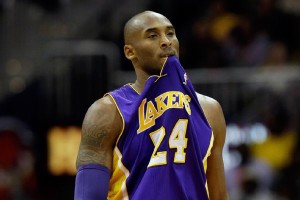 Kobe Bryant is the Black Mamba. He is a truculent monster. A bullheaded beast. He eats nails for breakfast and the hopes of opposing players for lunch, dinner and dessert. He is ruthless and cold, fearless and pensive, defiant and stubborn.
Kobe Bryant is the Black Mamba. He is a truculent monster. A bullheaded beast. He eats nails for breakfast and the hopes of opposing players for lunch, dinner and dessert. He is ruthless and cold, fearless and pensive, defiant and stubborn.
And nurturing.
Apparently.
Age has softened Kobe. He rejects conventional wisdom—specifically sentiments that suggest he won’t dominate at 36—but he’s more approachable these days, and more self-reflective to boot. Where he once wouldn’t cop to befriending anyone, he’s become something of a father figure for the 2014-15 Los Angeles Lakers.
Or so he says, according to ESPN Los Angeles’ Arash Markazi:
“My style is a little different with his group. It’s a little more nurturing,” Bryant said. “They’re so much younger, so it’s a little different. The important thing with this group is learning how to think the game all the way through, which is different than on teams that we have had in the past. We had a lot of veteran guys who had been around. So my teaching style is different.”
“Nurturing” and “Kobe” have never been synonymous with one another. Never, ever.
Consider the knowledge Markazi, with the help of Robert Sacre, drops here:
After Shaquille O’Neal was traded to the Miami Heat a decade ago, Bryant had always been the bad cop to someone else’s good cop on the Lakers. The good cop has changed over the years from Lamar Odom to Derek Fisher to Pau Gasol. But Bryant’s role never really changed.
Bryant would never sugarcoat anything and wasn’t the kind to put his arm around a struggling rookie and tell him everything will be OK.
“I didn’t even talk to the man,” Lakers center Robert Sacre said when asked about his first season as Bryant’s teammate. “I think the first two things I said to him were ‘ball’ and ‘outlet.’ Those were basically the only two things I said to him my first two weeks of training camp.”
Now that sounds more like Kobe.
The old Kobe.
Not old Kobe.
Playing for a team that obviously isn’t built to win a championship has changed the way he looks at his companions. Recovering from two serious injuries—one of which basically threatened his career—has done the same. Everything Bryant has gone through since 2012-13—right down to Dwight Howard’s arrival and departure—seems to have changed his perception of the game, and our perception of him.
As surreal as it may be to, at some point, watch Kobe put his arm around a Wesley Johnson or Julius Randle and tell them “Chin up, kid,” or something like that, it’s a necessary role for him to play. He might never admit it, but his best chance at leaving another lasting imprint on the Lakers organization lies in mentoring young players, fostering a productive culture and prepping the team for a title chase and return to prominence that might not take place until he says his final farewell.
Dan Favale is a firm believer in the three-pointer as well as the notion that defense doesn’t always win championships. His musings can be found at Bleacherreport.com in addition to TheHoopDoctors.com.


















